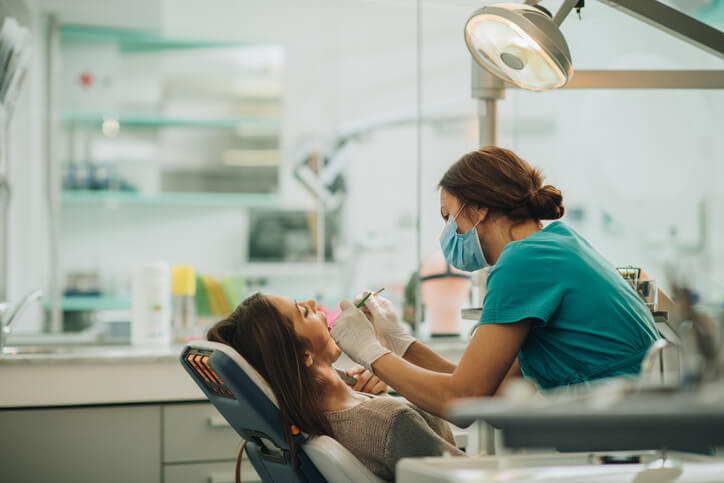A routine dental exam is necessary for monitoring the health of your teeth and gums. Many people put off regular dental care out of fear, but we’re here to help put your mind at ease regarding what to expect at your exam. This process is crucial to ensure the health of your teeth.
How Often Should I Have a Dental Exam?
Most dentists recommend a routine dental exam every six months for people with good oral health. Some patients have certain oral risks, like periodontal disease. These patients may require more frequent visits, so their specific gingival issues can be addressed.
What a Routine Exam Consists of
When you aren’t undergoing treatment for periodontal disease, your dental exam typically involves the following steps:
Medical History Update
Your dental exam will begin with reviewing and updating your medical history. The medications you take and any health issues can affect your dental health, and your dentist must be aware of these factors. Your medical history is helpful when determining the best treatment options for your oral health conditions.
Review X-Rays
You may receive an X-ray of your teeth to help identify areas of decay or other problematic conditions. X-rays are necessary because your dentist cannot see every part of the tooth with the naked eye.
Dental X-rays take less time than a traditional X-ray and produce significantly less radiation. This imaging is a safe and effective way to review your teeth for signs of disease or abscesses.
Checking the Soft Tissues
During the exam, the dentist will analyze your neck, jaw, and bite to ensure there aren’t any alignment issues you should be concerned with. Your lymph nodes will also be checked for signs of swelling or tenderness. These are indicators of potential inflammation and may require additional examination.
Oral Cancer Screening
Routine exams are used to check for any potential signs of oral cancer. Possible cases can be identified by unusual patches inside the mouth or abnormal growths surrounding the tongue or gums. When these issues are detected early, the dentist can refer you to another provider for continued care.
Monitoring Existing Restorations
The dentist will check your existing restorations to ensure that they are still intact. Bridges, crowns, and fillings can be tested to ensure they remain functional. If the dentist notices anything concerning, they will discuss their findings and make necessary recommendations for fixing faulty restorations.
Teeth Cleaning
Your routine dental exam may include a thorough cleaning, too. This process involves removing plaque and other debris from your teeth. Proper cleaning is required to prevent gingivitis, decay, and other conditions from developing.
Treatment Planning
If the dentist finds any suspicious areas during the dental exam, they will talk about the next steps with you. Any treatment options available to you will be discussed, and the dentist will explain how they work. The dental team will also provide alternatives to ensure your comfort during any treatment you may need.
Preparing for Your Dental Exam
Now that you understand routine dental exams, hopefully, any fears or anxieties have been put to rest. To prepare for your exam, have the following items ready:
- Medical history
- Allergies
- Current medications
These exams can be the difference between invasive dental procedures or a simple trip every six months.
Ready to Schedule a Routine Dental Exam?
Routine dental exams are crucial for monitoring the health of your teeth. If you’re looking for quality dental care in Nassau County and Queens, NY, contact Cohen Dental today to schedule a consultation. Our team of highly skilled dental professionals is dedicated to making sure your smile remains healthy and shining bright!

